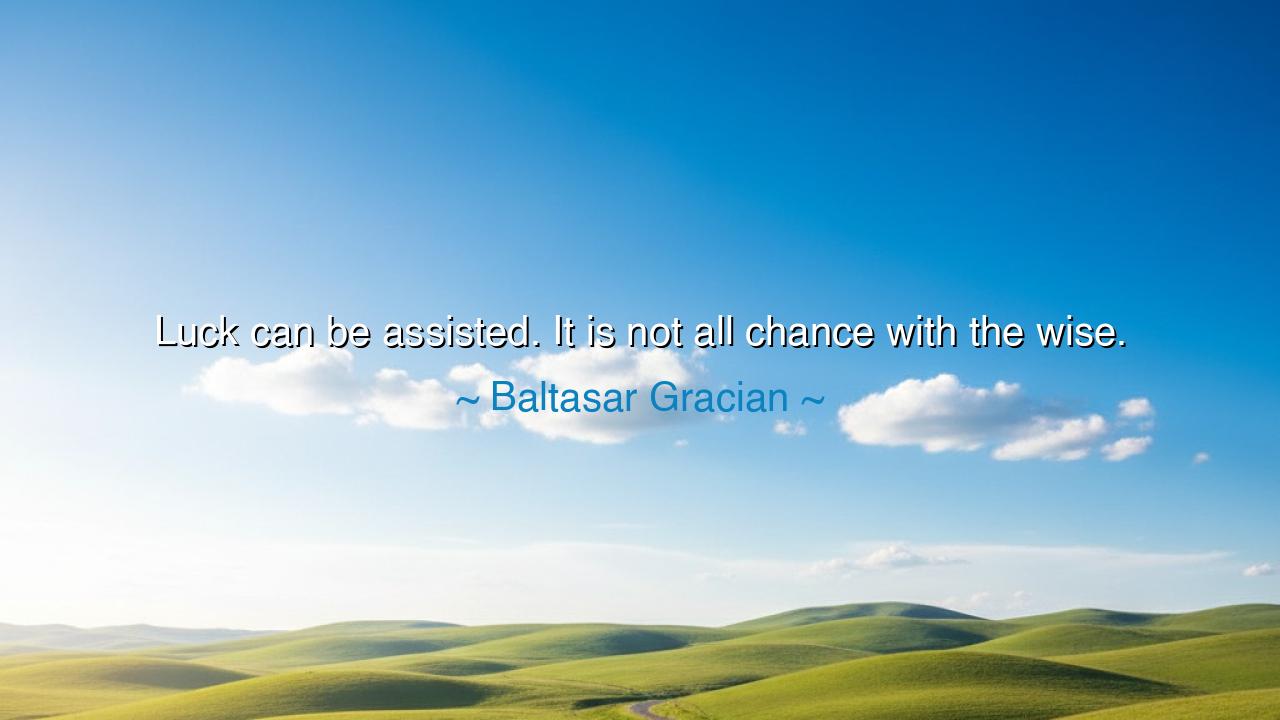
Luck can be assisted. It is not all chance with the wise.






In the grand flow of life, where the tides of fortune and misfortune rise and fall unpredictably, there is a profound truth buried within the words of Baltasar Gracian: “Luck can be assisted. It is not all chance with the wise.” These words speak to a timeless and ancient wisdom that recognizes luck not as a mere random force, but as something that can be shaped and guided by the wise. Gracian’s insight reflects the belief that fortune does not simply favor the unpredictable or the passive, but that those who are aware, who possess foresight and judgment, can bend the winds of luck in their favor.
The ancients understood that luck was not just a passive force, but a dynamic element that could be influenced by preparation and action. The Stoics, for example, taught that virtue was the key to navigating life’s uncertainties. They believed that while we cannot control external events, we can control our response to them. Epictetus, a Stoic philosopher, spoke often of the need to align our actions with nature and reason, suggesting that luck favors those who live with purpose and awareness. To the Stoics, fortune was not something to wait for passively, but something to engage with, to cultivate through thoughtful and wise actions. In this way, luck could be assisted by the right mindset and preparedness.
Consider the story of Alexander the Great, who, in his conquests, was often seen as the recipient of extraordinary luck. Yet, his victories were not purely the result of chance. Alexander’s strategic genius and preparation were key factors in his success. He was known for his meticulous planning, for carefully selecting the right moments to strike and the right allies to seek. His success was not simply a matter of fortune, but of understanding the dynamics of power, timing, and opportunity. In this way, Alexander’s luck was not random but was assisted by his own wisdom and foresight, a reminder that even in the realm of fortune, the wise play a crucial role.
A similar story can be found in the life of Thomas Edison, whose discoveries revolutionized the world. Edison is often seen as a lucky inventor, but his success was built not on blind chance but on tireless effort, experimentation, and the ability to see opportunity where others saw failure. Edison’s famous quote, “Genius is one percent inspiration and ninety-nine percent perspiration,” encapsulates the essence of luck that Gracian describes. Edison understood that while inspiration might spark the idea, it is the sustained effort and strategic action that ultimately bring success. In this sense, Edison did not rely on mere chance, but shaped his own fortune through relentless dedication and wisdom.
Gracian’s insight into luck also aligns with the ancient Chinese philosophy of Taoism, which teaches that life flows like a river, with constant change and unpredictability. But the wise, according to Laozi, the founder of Taoism, do not fight against the current; instead, they learn to flow with it. They understand that while they cannot control the river, they can navigate its course with skill and understanding. Like the Stoics, Taoism teaches that luck is not just about waiting for favorable winds but about adapting to the changes and opportunities that come your way. Luck, therefore, becomes something that can be assisted by aligning oneself with the natural flow of life.
The lesson in Gracian’s words is clear: luck is not purely a random force, but something that can be shaped by wisdom, preparation, and action. Just as Alexander the Great and Thomas Edison understood that fortune favors the prepared, we too must recognize that our success is not just about waiting for good luck to strike but about creating the conditions for it through hard work, foresight, and strategic thinking. Wise individuals do not passively wait for luck to favor them, but take active steps to seize opportunities, to make decisions, and to navigate the tides of life with confidence and awareness.
In our own lives, we must embrace the idea that luck is not an external force beyond our control, but a dynamic element that we can influence through our actions. We must prepare ourselves to take advantage of opportunities when they arise, to learn from failures, and to adapt to the challenges we face. Like the ancient heroes, philosophers, and modern leaders, we can assist luck by aligning our actions with wisdom, patience, and effort. Let us not wait idly for fortune to favor us, but take active steps toward creating our own luck, and in doing so, shape our destiny with the power of wisdom and purpose.






AAdministratorAdministrator
Welcome, honored guests. Please leave a comment, we will respond soon